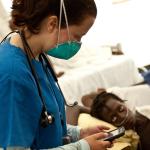Public health systems may be losing their monopoly on data about outbreaks of disease.
Researchers at Harvard Medical School and Childrens Hospital Boston found that news reports and social media can also collect accurate data, and deliver those results faster than government agencies.
When the cholera epidemic began in Haiti in late 2010, clinics and hospitals began sending reports to the Ministry of Public Health, which tracked the spread of the disease.
But at the same time, cholera stories began appearing in news reports, and social media users started talking about cholera in their Internet and mobile phone messages.
Rumi Chunara, who published her research in the American Journal of Tropical Medicine and Hygiene, found that those so-called "informal media" did a good job of tracking the official reports.
"So we found that there were similar patterns, like when the number of cases went up, so did the amount of this informal media, and as well when the number of cases was coming down, this pattern continued in the informal media," she says.
For their study, Chunara and her colleagues looked at news reports and other online information aggregated on the four-year-old website HealthMap.org, plus Twitter messages that mentioned cholera using the Research.ly search platform.
Chunara says official public health reports and information from informal media both have their uses.
Official statistics are carefully validated but can take time to be processed and released. In contrast, news and social media reports can be much quicker, "but it doesn't go through a rigorous evaluation process. So it would be a good kind of indicator that something's about to happen or maybe a way to calculate epidemiological patterns in real time to just get an assessment of what's going on and to be able to deploy control measures a lot quicker."
As social media and other new information sources expand, Chunara says, their usefulness in the field of public health is also likely to grow.
